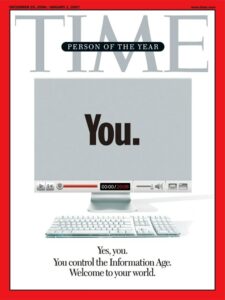The Limits of Your Feelings as News
(from a short post on Threads)
 When I first worked managing reader comments at NYTimes.com, the news was the subject and the comments were the reaction. But tools like Epinions and Blogger flipped the world so that the reactions became the substance. This made Mark Zuckerberg a billionaire and also led Time magazine to declare “You” the Person of the Year in 2006.
When I first worked managing reader comments at NYTimes.com, the news was the subject and the comments were the reaction. But tools like Epinions and Blogger flipped the world so that the reactions became the substance. This made Mark Zuckerberg a billionaire and also led Time magazine to declare “You” the Person of the Year in 2006.
It also heralded the slow (or maybe not so slow) degradation of the line between fact and feeling in the public square. What started as inclusion—or “presence” as we called it around 1999 when we marveled that you could turn on the houselights and let the audience see each other—became disregulation, entitlement and, worst of all, another vector for the powerful to manipulate the consumers.
Because no matter how much “voice” we all suddenly could have, the keys to the gates and the switches for the big spotlights were still in the hands of “old power.” So, along with flash organizing and citizen journalism, we got the coopting of “netizens” into grievance cults and narcissists, i.e., target markets.
It was jarring enough to go from top-down information authority to the freefall of a million channels, but the creation of new mobs who felt informed but were actually misinformed was more toxic and infectious than most of us could have envisioned (Renee DiResta and Noam Chomsky excluded). It’s like the plot twist at the end of the second Matrix movie that all those creepy dudes conveniently forget.
Today, watching the horror play out in Israel and Gaza, the degraded condition of the virtual square looks especially tragic.
When you turn the comments section into the news channel, it is: 1) impossible to keep the facts straight (much less find any helpful commentary); but also 2) unbearable to see 1000 friends and strangers lose all perspective between (wholly appropriate) emotion and (historically unresolvable) politics.
Social media, before it was given that problematic name containing its own tragic flaw, was supposed to engage with authority, not to counterfeit authority (and then act all aggrieved when its claims are questioned).
We are a self-involved and frightened species, with more reasons than ever to be legitimately terrified. But facts and feelings are not the same. The entire audience cannot fit onstage and if they could you’d probably leave by intermission.
Media and tech companies need to stop selling false equivalence to us and calling it knowledge or free expression. That is a formula for exploitation, not liberation.
